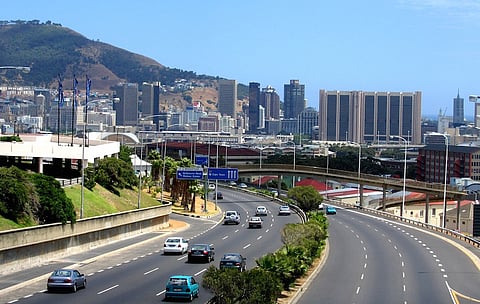South African economy on life support as companies fight recession, Covid
The South African economy was already in trouble before Covid side-swiped the financial system, leaving the country gasping for breath as the longest recession in nearly three decades sat on its chest. Daily, many hard-working citizens are losing their jobs as business owners tighten belts or shut down operations completely. Below, see how various companies in important industries have coped and kept afloat during this Covid crisis. – Jarryd Neves
How South African companies are battling the pandemic and recession
By Roxanne Henderson, Janice Kew, Felix Njini and Loni Prinsloo
(Bloomberg) – South African businesses have had to respond to the coronavirus and lockdown restrictions since March. At the same time, the country's economy is in its longest recession in 28 years, with millions reported to have lost their jobs due to the pandemic.
Here's how companies in key industries have coped with the unprecedented crisis:
Banks
South Africa's biggest lenders were faced with the pressing need to raise provisions to protect against souring loans, while demand for credit slumped as the coronavirus lockdown took a toll on business customers.
While Standard Bank Group Ltd. and Absa Group Ltd. boosted profit for the six months through June when provisions are excluded, Nedbank Group Ltd. failed to grow earnings by the same measure. FirstRand Ltd., reporting for the full year, also said profit fell before provisions.
Now banks must wait and see whether they have adequately prepared for future bad debts. South African regulators have encouraged the withholding of dividend payments amid uncertainty about the economic fallout from the pandemic.
Retailers
South African retailers can be roughly split between those that were allowed to trade during the country's strictest lockdown phase and those that weren't.
Supermarket giant Shoprite Holdings Ltd. was one of the big winners, tightening its grip on the local food market and even raising the dividend. Yet Edcon Holdings Ltd. said within days it may not be able to re-open its clothing stores after the shutdown. The owner of the Edgars and Jet chains filed for bankruptcy protection in April, with parts later sold off to other operators.
Walmart Inc.'s South African unit was in the middle of a turnaround plan when the lockdown started, yet Massmart Holdings Ltd. boosted gross margins and, crucially, could lean on its parent for cash. Pepkor Holdings Ltd., a low-cost clothing specialist, has taken advantage of those looking for discounts in the tough post-lockdown environment after fully reopening in June. Furniture retailer Lewis Group Ltd. has been a surprising short-term winner. After months of being stuck at home, together with some stimulus packages from the government, many South Africans are refurbishing their living spaces and the company last month declared a dividend.
"If you are in anything beyond food, you have a higher risk business," Shoprite Chief Executive Officer Pieter Engelbrecht said in an interview. "The terrible fear on our side is job security. A lot is going to be determined by how many people are going to lose their jobs and the government's plan to plug that hole."
Miners
Mining companies have been buoyed by a rally in the price of gold and platinum-group metals that's helped offset operational disruptions caused by South Africa's lockdown to contain the pandemic.
Sibanye Stillwater Ltd. restored dividend payments for the first time in three years, while Anglo American Platinum Ltd. said it's maintaining its payout ratio despite lower output. Impala Platinum Holdings Ltd. paid its highest dividend in nine years, with Chief Executive Officer Nico Muller promising more to come.
"We believe the strong metal prices will prevail," the CEO said. "We have all the belief in the world the dividend will continue to grow from strength to strength."
The flipside has been the challenge of returning hundreds of thousands of people to work in South Africa's mines at a time when Covid-19 infections were surging, causing a string of local outbreaks. Platinum producers also suffered from a slump in global demand as automakers halted operations, though China has returned to pre-Covid-19 levels and there's been no need as yet for job cuts.
Telecommunications
The pandemic brought some benefits for wireless carriers Vodacom Group Ltd. and MTN Group Ltd. as the government released broadband spectrum for the first time in 15 years. This was to deal with a large surge in voice and data traffic as people were forced to work and entertain themselves at home.
The additional spectrum also enabled the two largest operators in the country to start building commercial 5G networks.
"Telecom companies have been relative winners in that network traffic — data in particular — has grown, supporting revenue growth," said Bloomberg Intelligence analyst John Davies. "The longer term may bring headwinds from depressed economies and rising unemployment."
In light of that uncertainty, MTN opted not to pay an interim dividend.
Leisure
Tourism and lifestyle companies have struggled to navigate a lockdown policy that prohibited leisure travel and saw gyms as danger spots.
Brait SE's Virgin Active fitness chain has only recently reopened and a planned sale of the chain will be delayed by as much as 18 months. Distell Group Holdings Ltd., South Africa's biggest maker of wine and spirits, was hit by two bans on alcohol sales and reported a 23% slump in earnings in the year through June.
Sun International Holdings Ltd., a hotel and casino operator that owns the famous Sun City resort, was hurt by the alcohol and travel restrictions even after being allowed to reopen and plans to cut 2,300 jobs. But a swift recovery isn't impossible, according to Chief Executive Officer Anthony Leeming.
"We are quite positive and July was positive and August stronger," he said. "This business will recover and tourism will recover. Travel is something that most people with financial means want to do. It's just a matter of time."
Read also:

